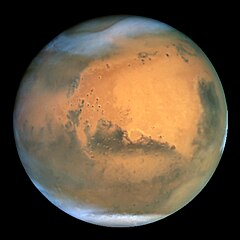Mars probably had rain, not just underground moisture
Saturday, June 28, 2008

After the discovery of ice on Mars, it's now thought that it used to have enough moisture in the atmosphere before to create rain from time to time. The article yesterday from spaceref.com
says that:
Geochimica et Cosmochimica Acta, hmm? That's Latin. Let's see when that journal began publishing...nope, looks like the Geochemical Society doesn't say. Well, I'll find out eventually. Anybody feel like making a call for me? I don't live in North America.
A new analysis of Martian soil data led by University of California, Berkeley, geoscientists suggests that there was once enough water in the planet's atmosphere for a light drizzle or dew to hit the ground, leaving tell-tale signs of its interaction with the planet's surface.
The study's conclusion breaks from the more dominant view that the liquid water that once existed during the red planet's infancy came mainly in the form of upwelling groundwater rather than rain.
To come up with their conclusions, the UC Berkeley-led researchers used published measurements of soil from Mars that were taken by various NASA missions: Viking 1, Viking 2, Pathfinder, Spirit and Opportunity. These five missions provided information on soil from widely distant sites surveyed between 1976 and 2006.
"By analyzing the chemistry of the planet's soil, we can derive important information about Mars' climate history," said Ronald Amundson, UC Berkeley professor of ecosystem sciences and the study's lead author. "The dominant view, put forward by many now working on the Mars missions, is that the chemistry of Mars soils is a mix of dust and rock that has accumulated over the eons, combined with impacts of upwelling groundwater, which is almost the exact opposite of any common process that forms soil on Earth. In this paper, we try to steer the discussion back by re-evaluating the Mars data using geological and hydrological principles that exist on Earth."
The final version of the study will appear online in Geochimica et Cosmochimica Acta, the journal of the International Geochemical Society, by the end of June, and in a print issue in August.
The Geochemical Society · One Brookings Drive, CB 1169 · St. Louis, MO 63130-4899 · 314-935-4131And one more part from the article on the new analysis:
The planet is currently too cold for water to exist in a liquid state, but scientists generally agree that during the planet's earliest geological period, known as the Noachian epoch and dating 4.6 billion to 3.5 billion years ago, there were enough atmospheric greenhouse gases to warm the air and support lakes and flowing rivers.
But unlike Earth, Mars does not have plate tectonics to help generate volcanoes and other terrestrial sources of greenhouse gases to sustain heat, explained Amundson. He said that many scientists believe that by the time the planet moved from the Noachian epoch to the Hesperian epoch, dating from 3.5 billion to 1.8 billion years ago, water on Mars had either frozen or evaporated. (The planet is now in its third geological time period, the Amazonian epoch, which started about 1.8 billion years ago.)
The new study, however, suggests that liquid water existed in the Martian atmosphere into the Hesperian era.
To support this view, the team showed that soil at the Viking, Pathfinder and Spirit landing sites had lost significant fractions of the elements that make up the rock fragments from which the soil was formed, a sign that water once moved downward through the dirt, carrying the elements with it. Amundson also pointed out that the soil records a long period of drying, as evidenced by surface patterns of the now sulfate-rich land. The distinctive accumulations of sulfate deposits are characteristic of soil in northern Chile's Atacama Desert, where rainfall averages approximately 1 millimeter per year, making it the driest region on Earth.







0 comments:
Post a Comment